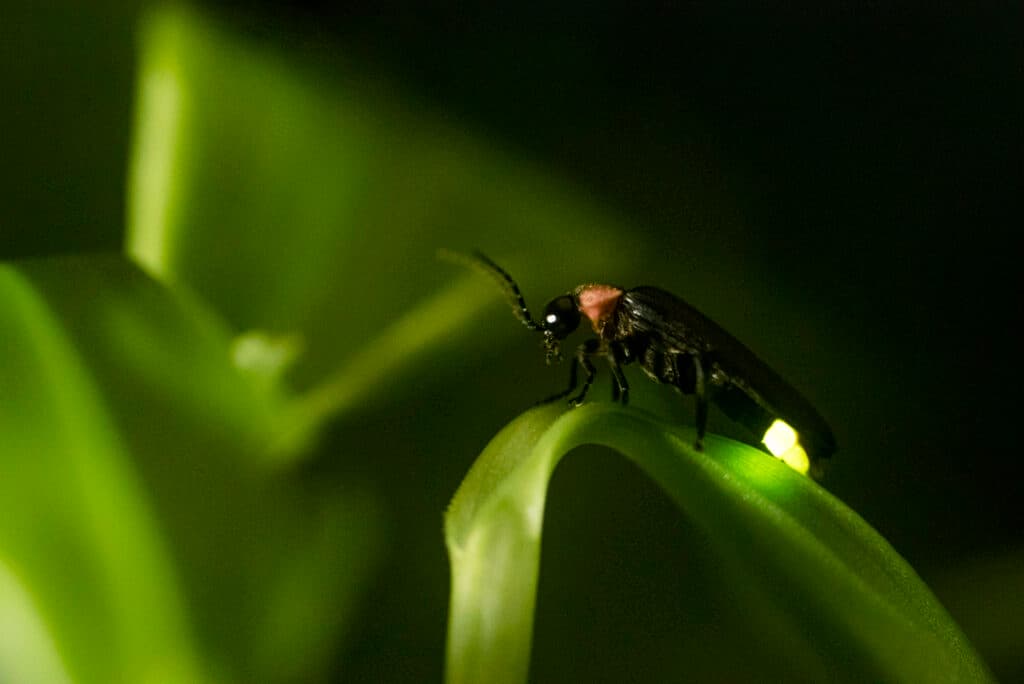Delightful Bugs: Fireflies produce their light with almost 100% efficiency. The heat produced by a candle is 80,000 times greater than that given off by an equally bright firefly. –nwf.org
You read it first in The Factory in Guide magazine.
Have you ever been outside on a hot summer night and noticed twinkling lights flying around your head? These are most likely lightning bugs! Fireflies! And they glow in the dark! A very fun thing to see in the summer. Their light can be yellow, orange, green, or blue.
Fireflies are actually from the beetle family, Lampyridae. There are over 2,000 different kinds of fireflies known around the world. They are considered arthropods, which are invertebrates. This means they lack a backbone, but have an outside shell called an exoskeleton. Fireflies use their light to talk to each other and to find a mate. When a possible mate sees the flashes, it returns the signal.
So, what makes these tiny flying creatures glow? Great question! Fireflies make light through a special chemical reaction called bioluminescence. This happens in special light-producing organs, usually on the lower part of their abdomen (belly). They make light by mixing chemicals with oxygen from the air.
Here's how it works: An enzyme called luciferase mixes with a chemical called luciferin. This reaction also needs magnesium ions, ATP (which is like energy for cells), and oxygen. When these combine, they create light! But it is also a toxic, distasteful chemical defense. If you catch a firefly you may notice droplets of this thick, white substance seeping out from their bodies. Not too many things eat fireflies as a result. Believe it or not, it could take as few as 20 fireflies to provide a fatal dose of luciferin to an adult human! Always ask an adult first, and then wash really well after handling anything in the wild.
Fireflies retire into the ground during the day. At night, they tend to flock to dark, open areas where their lights can be the most noticeable. The best time to see them is in the later evening hours on dry summer nights.

Like other beetle species, their life cycle can be divided into 4 distinct stages: egg, larva, pupa and adult. While not all species light up as adults, they all glow during the larval stage, and some even glow as eggs!
Like many insects, fireflies spend most of their lives as larvae, hiding in the leaf litter or underground during the daylight hours and prowling for prey at night. You can often see their soft glow on the ground in moist areas after dark. (For this reason they are often referred to as glow worms.) They typically overwinter in the larval stage and complete their metamorphosis the following year. An individual adult firefly lives for only about 3-4 weeks.
Some fireflies can even flash their lights all at once, in unison! This is called synchronization. It happens a lot with tropical fireflies, especially in Southeast Asia. Along river banks in Malaysian jungles, thousands of fireflies flash at the exact same time. In the United States, you can see this amazing sight every year in places like Elkmont, Tennessee, in the Great Smoky Mountains, and at Congaree National Park in South Carolina.
Did you know there is actually a time to celebrate these glowing beetles? It’s called World Firefly Day which is usually the first week of July. And in Japan, they even have special parks just for viewing fireflies!
John 1:7 says: “This man (speaking of John the Baptist) came for a witness, to bear witness of the Light (Jesus), that all through him might believe." Let’s all do our best to be like a firefly and spread the light of Jesus' love everywhere we go!
—Carol Lyons, Assistant
Discovery Mountain
Scripture taken from the New King James Version, Copyright 1982 by Thomas Nelson. Used by permission. All rights reserved.
Learn More About This Fact
For more interesting facts, click on the buttons below!

